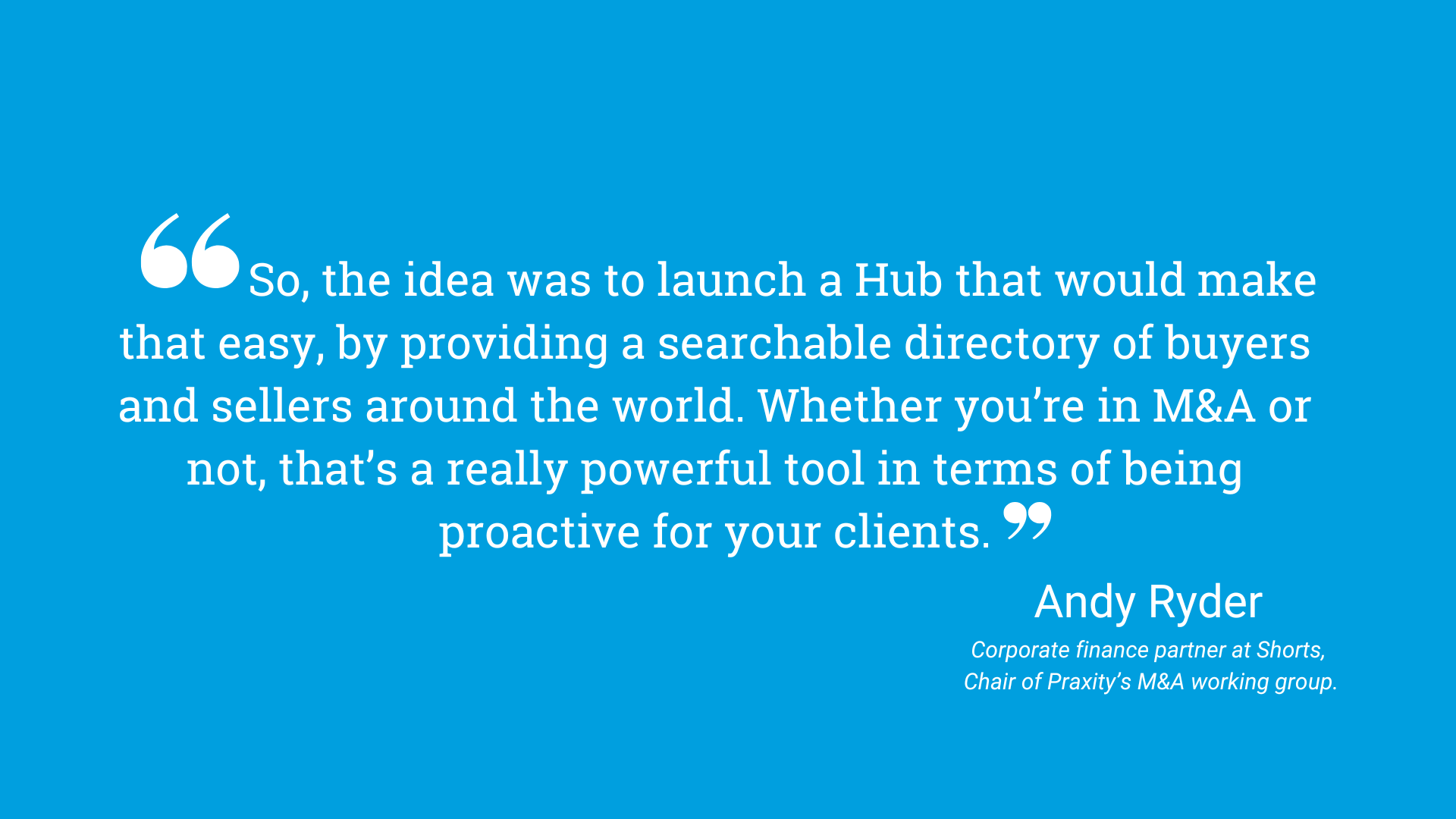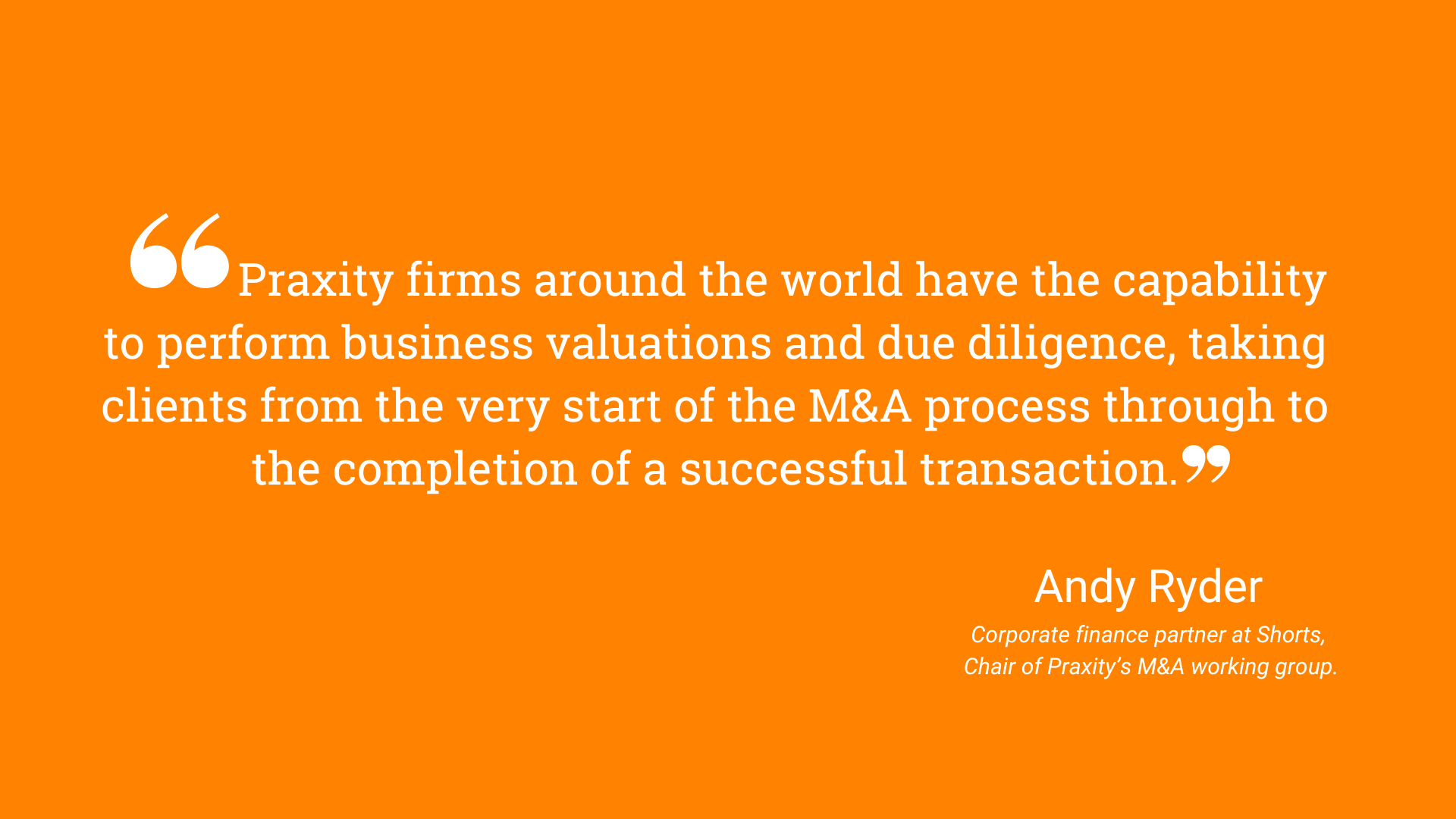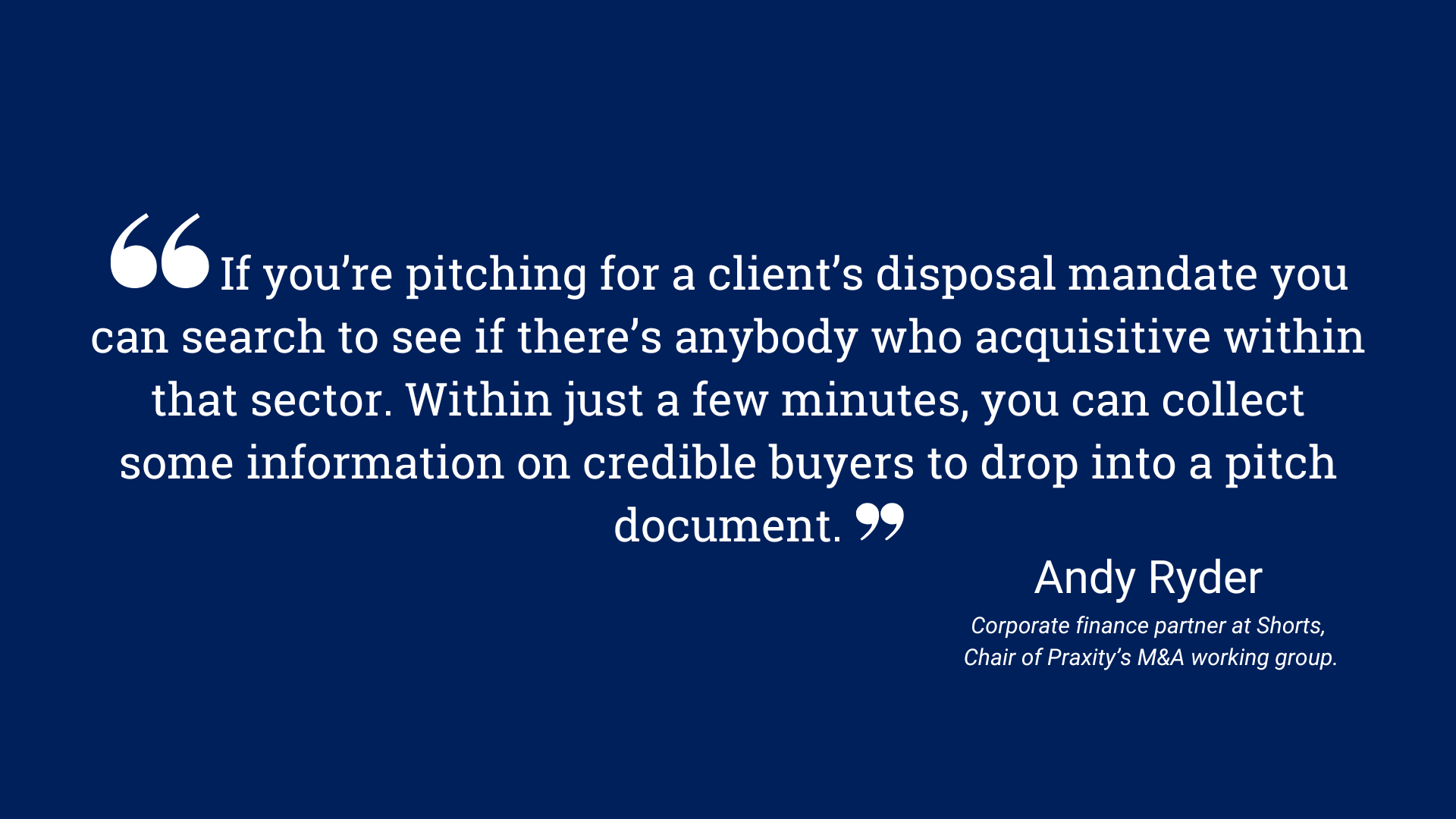Mergers & Acquisitions: Praxity
Praxity launches international M&A Hub
In Q3 2022, Praxity, the world’s largest alliance of independent accounting firms, launched an innovative new Mergers & Acquisitions (M&A) Hub for its members. Here, Andy Ryder, corporate finance partner at Shorts and chair of Praxity’s M&A working group, speaks to Zoya Malik, Editor-in Chief, International Accounting Bulletin to explain how the Hub aims to support the deal-making process – and how you can benefit.

Zoya Malik: What is Praxity’s objective in launching the M&A Hub?
Andy Ryder: We wanted to harness the power of the alliance, ensuring we were making the most of Praxity’s reach around the world to add further value to the M&A process for our clients.
If you're in M&A, you want to connect – to make sure you don’t miss the strategic buyer for your business or potential seller who would suit you as a bolt-on acquisition, in maybe a different part of the world. The broader you can go, the more chance you have of an optimal deal happening for the client. So, the idea was to launch a Hub that would make that easy, by providing a searchable directory of buyers and sellers around the world. Whether you’re in M&A or not, that’s a really powerful tool in terms of being proactive for your clients.
ZM: What investment has been made in researching and developing the platform for members?
AR: When I took the idea to Praxity they were incredibly supportive. We then carried out a survey of member firms to gauge interest that came back overwhelmingly positive. Praxity started investing in building the web Hub, while the member firms spent a lot of time testing it and feeding back on the user experience. So there’s been quite a significant investment in terms of both hours and resource.
ZM: How are you connecting with members to maximise the Hub’s reach and encourage them to list businesses for sale, and how will the platform be integrated for partner enterprise and support?
AR: In numerous ways – showcasing what it does at conferences, talking to people about the benefits, and that’s been followed by coverage in Praxity’s magazine, as well as newsletters and emails to people we feel should be interested in its benefits. So, there have been lots of different contact points to encourage members. In terms of integration, the Hub sits within the existing Praxity website and members can access support from Praxity’s Executive Office.

ZM: What are the key features of the M&A Hub and how much of the M&A process will be made available?
AR:
Effectively, it is the front end of a mergers and acquisition process – a matching service. It’s trying to match buyers and sellers in a very intuitive and simple way.
For example, if your client’s business is for sale, you can go on the Hub, share the key details and click post. The Hub then automatically matches and emails you if it has somebody looking to buy something like that – if not at that moment, then whenever someone does express interest. The Hub only advertises anonymous details of a business to professionals within Praxity, so you would then contact the advisor on the other side and start talking directly. All the Hub is trying to do is put people in touch – but that’s a really important step, because it means you’re reaching more potential buyers or sellers, significantly increasing the chances of a successful deal.
It can also be used as a research tool: for example, if you’re pitching for a client’s disposal mandate you can search to see if anybody wants to make an acquisition in that sector. Within just a few minutes, you can collect some information on credible buyers to drop into a pitch document.
ZM: How will Praxity support members with business valuations and due diligence?
AR: Praxity firms around the world have the capability to perform business valuations and due diligence, taking clients from the very start of the M&A process through to the completion of a successful transaction. Within the alliance, there are also working groups focused on this later element of the process, including the FAS (financial advisory services) group, comprised of member firms’ specialists who collectively share their expertise.
ZM: How are you pricing for this service and how will Praxity measure ROI in this platform offering?
AR: It’s free for all Praxity members, and there’s no charge to any clients. We are closely tracking member firms’ feedback on how it is working for them. Of course, M&A can be a drawn-out process, but the level of interaction from members indicates the Hub has already been very well received within the alliance.

ZM: Which regions will see most activity, and what trends are you currently seeing in terms of M&As within the accounting industry?
AR:
Certainly, the UK is very busy in terms of M&A, as people are seeing value in UK assets. In terms of sector, tech has had a really long bull run, but we are seeing this trend play out across most industries. Post Covid, because of difficulties with global supply chains, people are wanting to make acquisitions to secure their supply chain activity. There has also been quite a lot of activity around ESG (environmental, social, and governance) requirements – for example, a client might want to acquire a supplier whose manufacturing process makes their products more environmentally friendly. The positive M&A trend is, however, pretty much across the board and often with an international element.
Within the accounting industry, we’re seeing very positive trends: my firm Shorts will have a record year in M&A, and when I talk to my peers, the M&A sector is really buoyant; there's still quite a lot of cash that’s looking for a home. Times are still uncertain, but people tend to get used to uncertainty and think, well, we need to get on with it! People are therefore being pragmatic and finding ways to agree a deal.
ZM: What value will you gain from capturing data on member activity and how will you convert this value to benefit clients?
AR: The Hub helps members better serve their clients, by offering insights into the dynamic global market for M&A and opening new channels of communication. That is where we see its value: as a vast worldwide resource that allows members to connect and to create new opportunities, while maintaining their successful, independent approaches. Given the nature of M&A, Praxity does not retain information on the status of each posted mandate – but, through the connections it provides, member firms can access a global alliance of experts in this area for information and advice.

ZM: Can you describe the user journey?
AR:
The intention has been to make it as user-friendly and intuitive as possible. So, on the Praxity website, a user logs in, goes to the Hub, and visits the ‘Posting Businesses For Sale' page to fill in details of the business they would like to share. The site won’t ask you to name the business you are looking to sell, but you can add details such as sector, turnover, EBITDA, country and region etc, as well as a brief, anonymous, description of the business’s activities. You can then simply publish your post, and that's it done. After that, the Hub will send an automated email if there’s a match. A similar process applies if you are posting the acquisition criteria of your client who is looking to buy a business.
There is also a search function which, again, is straightforward and brings up a list of businesses matching the criteria you enter, that can be exported easily. You can set up notifications to be alerted when a business is newly listed that matches your saved searches. So it's not time-intensive to use – it's quite the opposite, hopefully. The Hub has been actively marketed to members for several months. M&A deals can take some time to complete, but so far the feedback has been very positive.
ZM: How did you consider the privacy element when designing the site, and what data sharing, privacy and security protocols have been implemented across the M&A Portal?
AR: Privacy has been a key consideration. First and foremost, it is only accessible by Praxity member firms. The portal is password-protected. Members need to request access to post, and the data shared is anonymised. If someone does show interest in a post, they would not be able to access the details of the person who posted it – instead, that person can contact them directly, off the Hub. Throughout, the focus has been on ensuring a secure, simple user experience.
Main image: Andy Ryder, chair of Praxity’s M&A working group and corporate finance partner, Shorts